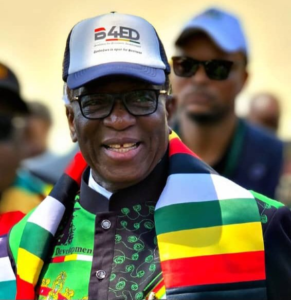HENRIETTA RUSHWAYA: A TALE OF INFLUENCE AND IMPUNITY

Henrietta Rushwaya, a figure embroiled in controversy and scandal, has once again dodged stringent legal consequences, highlighting a disturbing narrative of influence and impunity in Zimbabwe’s justice system. Rushwaya, closely related to Zimbabwean President Emmerson Mnangagwa and other high-ranking officials, recently received a remarkably lenient sentence for a serious offense, starkly contrasting with the harsh penalties meted out to ordinary citizens for far lesser crimes.
Rushwaya, President of the Zimbabwe Miners’ Federation and a relative of Martin Rushwaya, a chief secretary in the Office of the President and Cabinet, was found guilty of gold smuggling. Despite the gravity of her offense, she received a mere slap on the wrist—a fine of US$5,000 and an 18-month prison sentence, wholly suspended. This leniency is in sharp contrast to the fate of ordinary Zimbabweans, such as Benson Muchemanyama and Welldone Darlington Ncube, who faced five-year jail terms for possessing minuscule amounts of gold without proper licenses.
The disparity in treatment is glaring. While Rushwaya, with her influential connections, escapes with minimal punishment, individuals like former deputy finance minister Terrence Mukupe endure harsher consequences for lesser offenses. Mukupe and his accomplices were sentenced to three years in prison for importing diesel without paying duty. This dichotomy underscores the power of connections and the apparent imbalance in Zimbabwe’s judicial system.
Rushwaya’s case is not an isolated incident but part of a pattern of apparent judicial leniency linked to her family connections. Her uncle, President Mnangagwa, and other senior officials of the ruling Zanu PF party, have been perceived as shields against the full weight of the law. Additionally, her proximity to former vice-president Joseph Msika, under whom she served as director of sport, further illustrates her deep-rooted connections within the political elite.
Her recent indictment and the surprise conviction by the High Court might have signaled a shift in judicial independence, but the leniency of her sentence suggests otherwise. This perception is bolstered by allegations of past misconduct, including match-fixing during her tenure as chief executive of the Zimbabwe Football Association and involvement in money laundering schemes, as exposed by an Al Jazeera undercover investigation.
Rushwaya’s involvement in these schemes, particularly in gold smuggling and money laundering, was laid bare in the Al Jazeera report. The investigation revealed her discussing the use of private jets for gold smuggling and offering assistance in laundering large sums of money through the Reserve Bank of Zimbabwe’s Fidelity Printers and Refiners.
The Rushwaya saga, from her controversial past to her recent court dealings, paints a troubling picture of the intersection of power, influence, and justice in Zimbabwe. It raises critical questions about the integrity of the judicial system and the equal application of the law, especially when those in high places or with influential connections are involved. As Zimbabweans grapple with these issues, the Rushwaya case stands as a stark reminder of the challenges facing the nation’s pursuit of fairness and justice.



